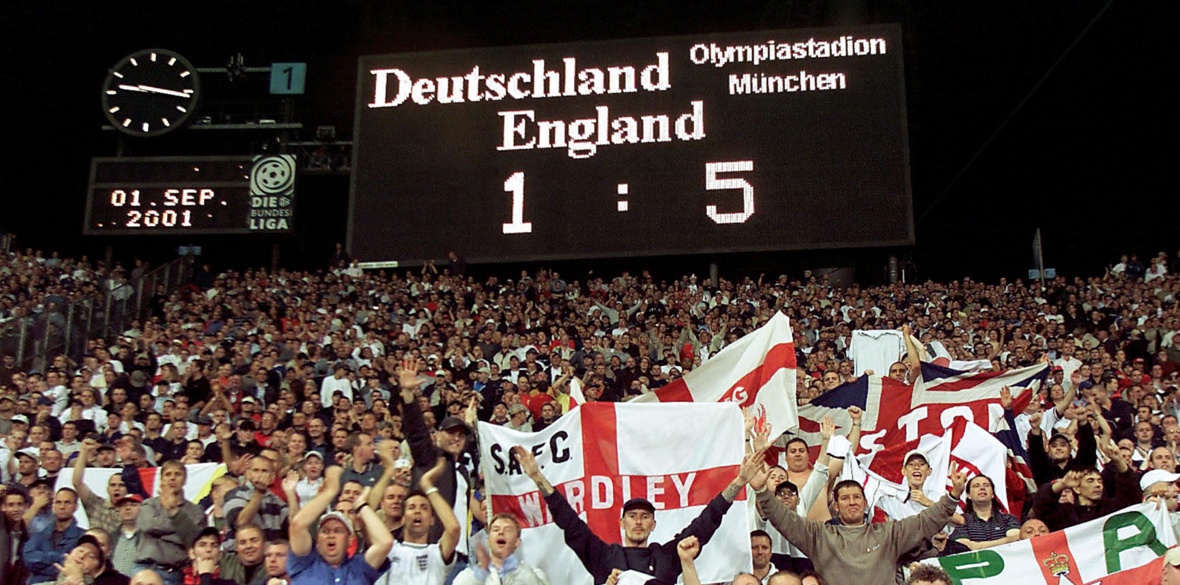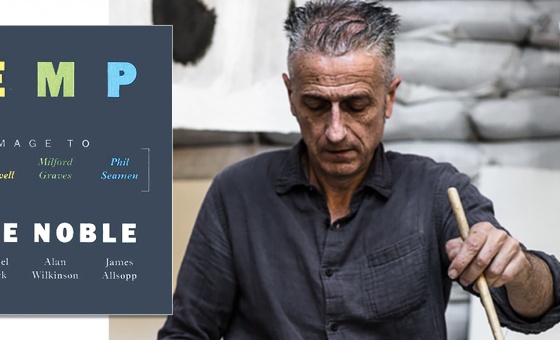This is the last article you can read this month
You can read more article this month
You can read more articles this month
Sorry your limit is up for this month
Reset on:
Please help support the Morning Star by subscribing here
IT HAS become one of the most iconic images in the 149-year history of the England football team. The gigantic scoreboard above the celebrating away fans in Munich’s Olympiastadion displayed a simple message in golden letters that reverberated around the world: Deutschland England 1:5. With 14.6 million watching the live BBC coverage, legendary commentator John Motson signed off with the words: “It was a night to say you were there.”
In 20 years of following the national team around the world it remains my favourite memory of watching England abroad. Not until I saw Luke Shaw half-volley England into the lead at the Euro 2020 final has any moment in football surpassed the joy of seeing Steven Gerrard fire home his first international goal to give England a half-time lead in Germany that was never relinquished. After that it just got “better and better and better.”
For Motson the highlight came at the end, when the Four Tops’ 1988 hit Loco in Acapulco blasted around a disbelieving stadium. “When the final whistle went I just looked at the scoreboard because I couldn’t really believe what I’d just seen,” he tells me. “I had a look at it to confirm that it was really 5-1.”
Three subsequent victories over Germany, culminating in this summer’s Euro 2020 win at Wembley, should never diminish how startling the result, never mind the scoreline, was.
Going into the game, England had not won on German soil for 36 years. The Germans had only ever lost one of 60 World Cup qualifiers — an irrelevant defeat to Portugal in 1985 with their own qualification already assured. They were undefeated in competitive matches at Munich’s Olympiastadion, where they had won the 1974 World Cup final.
A year had passed since Germany had won the reverse fixture — the last ever match at old Wembley. That defeat had left England without a permanent manager after Kevin Keegan resigned, and a long way adrift of their rivals for their group’s solitary automatic qualification berth to the 2002 World Cup in Japan and South Korea.
Sven-Goran Eriksson had been appointed as the first foreign manager of England at the start of 2001, but the feel-good factor generated by five straight victories at the back end of the previous season had been tempered by a chastening 0-2 home defeat to the Netherlands, in which England’s novice left-back Ashley Cole had been run ragged by Boudewijn Zenden.
That defeat had come just 16 days before the game in Munich, while just six days before it David Beckham had limped off at Villa Park after incurring a groin strain — making the England captain a doubt for the match.

“ I think even if we had drawn in Germany or won narrowly, we’d have been satisfied. But nobody expected us to win 5-1 and to run away with the game like we did in the second half. ”
Most England supporters, including this one, travelled to the game more in misguided hope than real expectation. The Germans stood six points clear of England in the qualification group and victory would have assured them of their World Cup place that night. So certain were they of their progress that they had already scheduled preparatory fixtures in the Far East on the dates of the qualification play-offs reserved for the runners-up of each group.
Nevertheless, on a damp, overcast evening in Bavaria, expectations were turned on their head after an unforgettable ninety minutes of unceasing incident. And the now retired Motson believes that night in Munich was unsurpassed in the course of his 50 years working for the BBC.
“It was the most exciting England performance probably of my commentating career,” he says. “Germany were such a curse for England. Every time we played Germany there was a feeling that this was going to be a critical game.
“I think even if we had drawn in Germany or won narrowly, we’d have been satisfied. But nobody expected us to win 5-1 and to run away with the game like we did in the second half.”
Outside the ground, England fans emptied boxes of match-day programmes, priced at 3 Deutsche Marks (£1), faster than they could be opened. Now 20 years on, they still sell on eBay for upwards of £25.
Beckham was passed fit to lead out a youthful England side in which goalkeeper David Seaman was the only remaining player from the Euro ’96 semi-final defeat to the Germans five years earlier. Back home, a quarter of the UK population tuned into BBC Match of the Day Live for a Saturday evening prime-time kick-off.
Within six minutes a straightforward move by the home side ended with Carsten Jancker toe-poking the ball past Seaman. To rub salt in the wound, the striker – often derided in England – was proclaimed by the stadium announcer in the Bayern tradition, by his first name “Carsten,” provoking over 50,000 German fans to echo: “Jancker — Fussballgott.” Like all England fans, Motson had that familiar “sinking feeling. Oh here we go again, we never beat the Germans.”
Yet England were level six minutes later — Michael Owen equalising after a rush of blood from German goalkeeper Oliver Kahn presented him with an open goal. Four months earlier Kahn had made three penalty saves in Milan to win the Uefa Champions League final, and the following year he would earn the prestigious Golden Ball at the Fifa World Cup, ahead of Ronaldo.
But this was not his night. At fault for the first and third England goals, BBC pundit Mark Lawrenson famously labelled him “Oliver Can’t” at half-time.
Although England played the more fluent football – Owen a constant thorn in the German defence’s side – the first half could have gone either way. Sebastian Deisler should have put the home side back in front, scuffing his shot with only Seaman to beat: “a ghastly miss,” according to Motson.

“ I think Gerrard scoring when he did — I know it was 1-1, but I think England were climbing back into the game, and then they scored just before they went off for the half-time team-talk. ”
In first-half stoppage time, a rasping drive from German left-back Jorg Bohme elicited a world-class save from Seaman, just seconds before what Motson believes was the pivotal moment of the match. “I think Gerrard scoring when he did — I know it was 1-1, but I think England were climbing back into the game, and then they scored just before they went off for the half-time team-talk.
“Obviously there was a possibility that Germany might come back. But I think when you score a goal just before half-time, I always feel it gives the team that have scored it a psychological edge, and I think that’s what the Gerrard goal gave England really.
“England came out revitalised after whatever Sven-Goran Eriksson had said in the dressing room. They then preceded to run away with the game.”
Owen scored twice more to complete the hat-trick that his all-round performance merited. As the forward summersaulted towards the corner flag underneath me, Motson uttered his immortal line: “This is getting better and better and better — one, two, three for Michael Owen: England lead 4-1 in Germany.”
Speaking to me 20 years on, Motson explains how those words captured the imagination of even those who, like myself, had watched the game back later.
“A number of people latched on that phrase, and when I went to West Ham to watch a game a few weeks later a voice in my ear as I walked back to my seat at half-time was saying: ‘It’s getting better and better and better’. It was Sven-Goran Eriksson — who had just watched the video!”

“ Owen, at that time, was at his peak. He was a fantastic finisher and a man for a big occasion as well ”
Then aged 21, Owen’s hat-trick was the culmination of a rich vein of form which had won him five trophies with Liverpool that year, leading him to be voted as the 2001 European Footballer of the Year — England’s last winner of the coveted Ballon D’Or.
Motson is in no doubt that Owen’s performance that night earned him the title. “Without doubt, that game was obviously high-profile all over Europe. Owen, at that time, was at his peak. He was a fantastic finisher and a man for a big occasion as well, it might be said.”
After Emile Heskey made it 5-1 in the 74th minute, the German supporters began jeering their own players and attempted to throw their seat cushions across the athletics track onto the pitch. On it, like a matador taunting a bull, Gerrard twice played the ball around his Liverpool teammate Dietmar Hamann before laying it off — Gary Neville backheeling the ball out of defence.
As the 5-1 scoreboard above the home fans malfunctioned and blacked out, the German supporters joined their English counterparts in a rendition of Monty Python’s Always Look on the Bright Side of Life.
The four-goal margin of victory was to prove decisive as England qualified automatically for the World Cup ahead of Germany on goal difference. It also eclipsed the only other comparable recent competitive win — England’s 4-1 victory over the Netherlands at Euro ‘96. With a predictable war reference, the News of the World’s headline the next morning read: “Don’t Mention the Score.”
Soon after the victory, then FA chief executive Adam Crozier allegedly began talking to the media about a “golden generation” of England footballers. “Sven had obviously got a team of very talented players together,” says Motson. “That goes without saying. I think that people were hopeful that we would do something very significant in Japan a year later.”
But that expectation would become a burden to the players, who failed to progress beyond the last eight at three successive major tournaments.
This summer the England team reached new heights by making it to the Euro 2020 final after Gareth Southgate, an unused substitute in Munich, led the team to victory over Germany.
Motson admits that being at Wembley in July as a spectator gave him “just as much pleasure,” but 20 years on it’s clear that the elation of the 5-1 victory will never diminish.
“I still think it’s fresh in the memory,” he says. “When people ask me: ‘Was that the most exciting game you commentated on?’ I’d say, from an England perspective, it was. That memory will never fade.”









